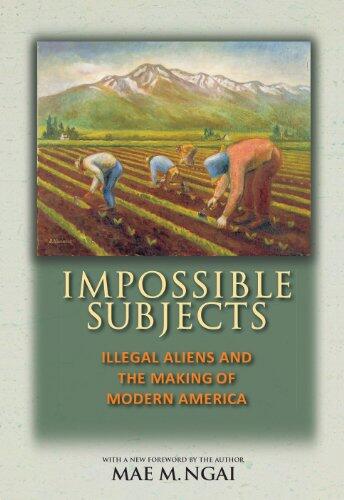
Impossible Subjects: Illegal Aliens and the Making of Modern America - Updated Edition
によって
Mae M. Ngai
まだ評価がありません
Science Fiction
History
Manga
形式
ペーパーバック
ページ数
416
言語
英語
公開されました
Apr 27, 2014
出版社
Princeton University Press
版
Revised
ISBN-10
0691160821
ISBN-13
9780691160825
説明
In her updated edition, Mae M. Ngai delves deep into the complex world of immigration and its impact on American society. She meticulously examines illegal immigration, positioning it as a pivotal issue in the formation of modern America. Through a historical lens, Ngai explores how various policies and societal attitudes have shaped the notion of who belongs and who is deemed an outsider.
Ngai’s narrative bridges the past and present, revealing that the question of citizenship is not merely a legal matter but one imbued with social and cultural dimensions. She highlights the struggles of illegal aliens, illustrating their experiences and the challenges they face, which often reflect broader national anxieties about identity and belonging. By doing so, she uncovers the often invisible lives behind immigration debates, inviting readers to empathize with their plight.
The author’s research is thorough and thought-provoking, offering insights into how immigration laws have evolved and their implications for societal cohesion. She skillfully weaves together personal stories and statistical data, creating a comprehensive portrait of the immigrant experience in contemporary America.
Her work serves as a critical reminder of the historical context of immigration policy and its ongoing significance in addressing issues of race, class, and citizenship. Through this lens, Ngai encourages readers to reconsider their perceptions of illegal aliens and the broader framework of American identity.
Ngai’s narrative bridges the past and present, revealing that the question of citizenship is not merely a legal matter but one imbued with social and cultural dimensions. She highlights the struggles of illegal aliens, illustrating their experiences and the challenges they face, which often reflect broader national anxieties about identity and belonging. By doing so, she uncovers the often invisible lives behind immigration debates, inviting readers to empathize with their plight.
The author’s research is thorough and thought-provoking, offering insights into how immigration laws have evolved and their implications for societal cohesion. She skillfully weaves together personal stories and statistical data, creating a comprehensive portrait of the immigrant experience in contemporary America.
Her work serves as a critical reminder of the historical context of immigration policy and its ongoing significance in addressing issues of race, class, and citizenship. Through this lens, Ngai encourages readers to reconsider their perceptions of illegal aliens and the broader framework of American identity.



















